Analysis of the Nagorno-Karabakh Conflict in Public International Law
VerifiedAdded on 2022/12/29
|10
|3416
|41
Essay
AI Summary
This essay examines the Nagorno-Karabakh conflict, a long-standing dispute between Armenia and Azerbaijan, through the framework of public international law. It begins with an introduction to the historical context of the conflict, tracing its roots back to the fall of the Russian Empire and the subsequent clashes over the Nagorno-Karabakh region. The essay then delves into the legal status of Nagorno-Karabakh, discussing the arguments surrounding self-determination, territorial integrity, and the principle of uti possidetis juris. It explores the claims of both Armenia and Azerbaijan, considering the rights of the Armenian majority population and the Azerbaijani assertion of territorial sovereignty. The essay analyzes the application of international legal principles, including the UN Charter, Security Council resolutions, and the concept of remedial secession, to the specific circumstances of the conflict. It also considers the factors influencing the current status of Nagorno-Karabakh, including the role of international actors and the challenges of achieving a lasting resolution. The essay concludes by summarizing the key legal issues and the complexities of the Nagorno-Karabakh conflict.
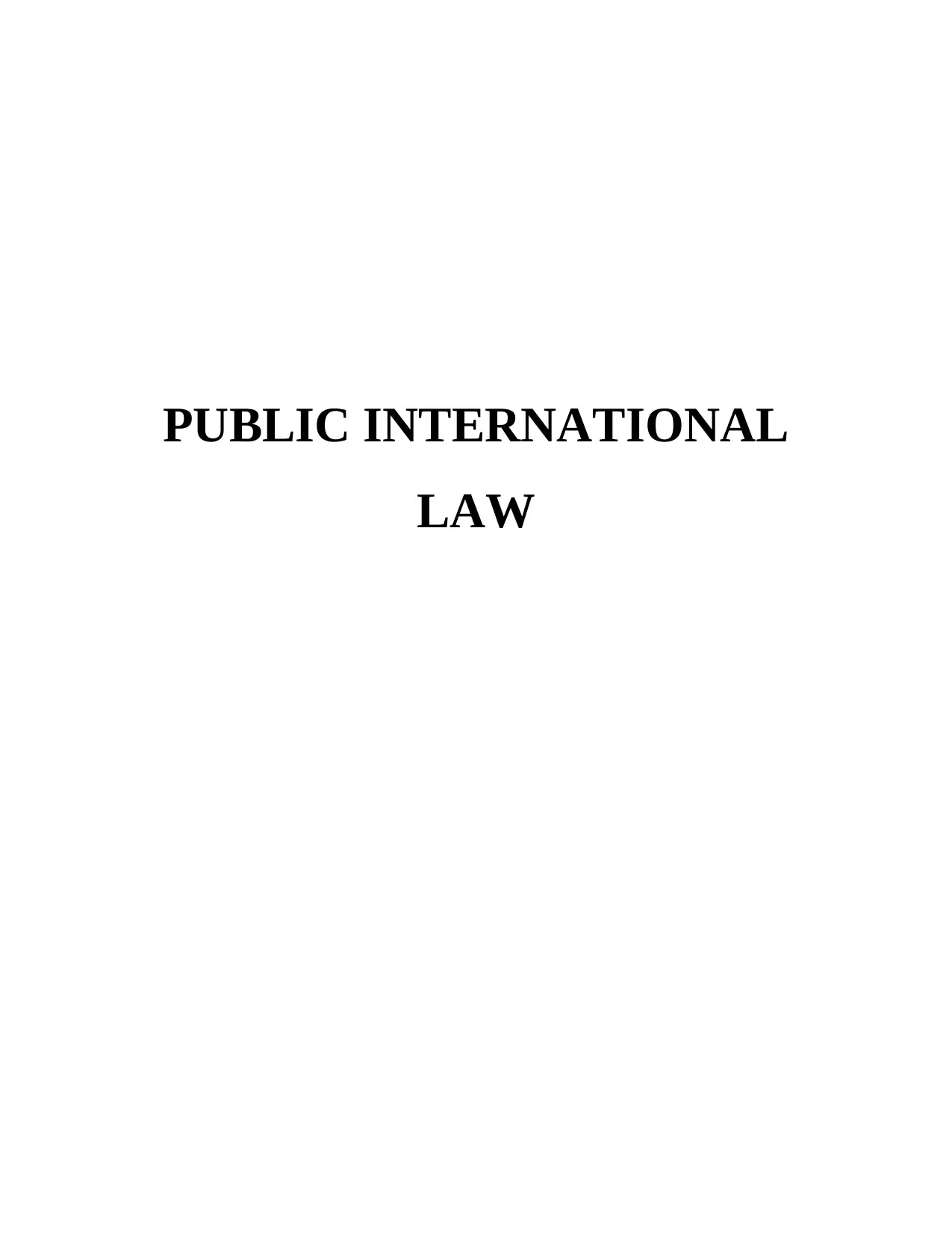
PUBLIC INTERNATIONAL
LAW
LAW
Paraphrase This Document
Need a fresh take? Get an instant paraphrase of this document with our AI Paraphraser
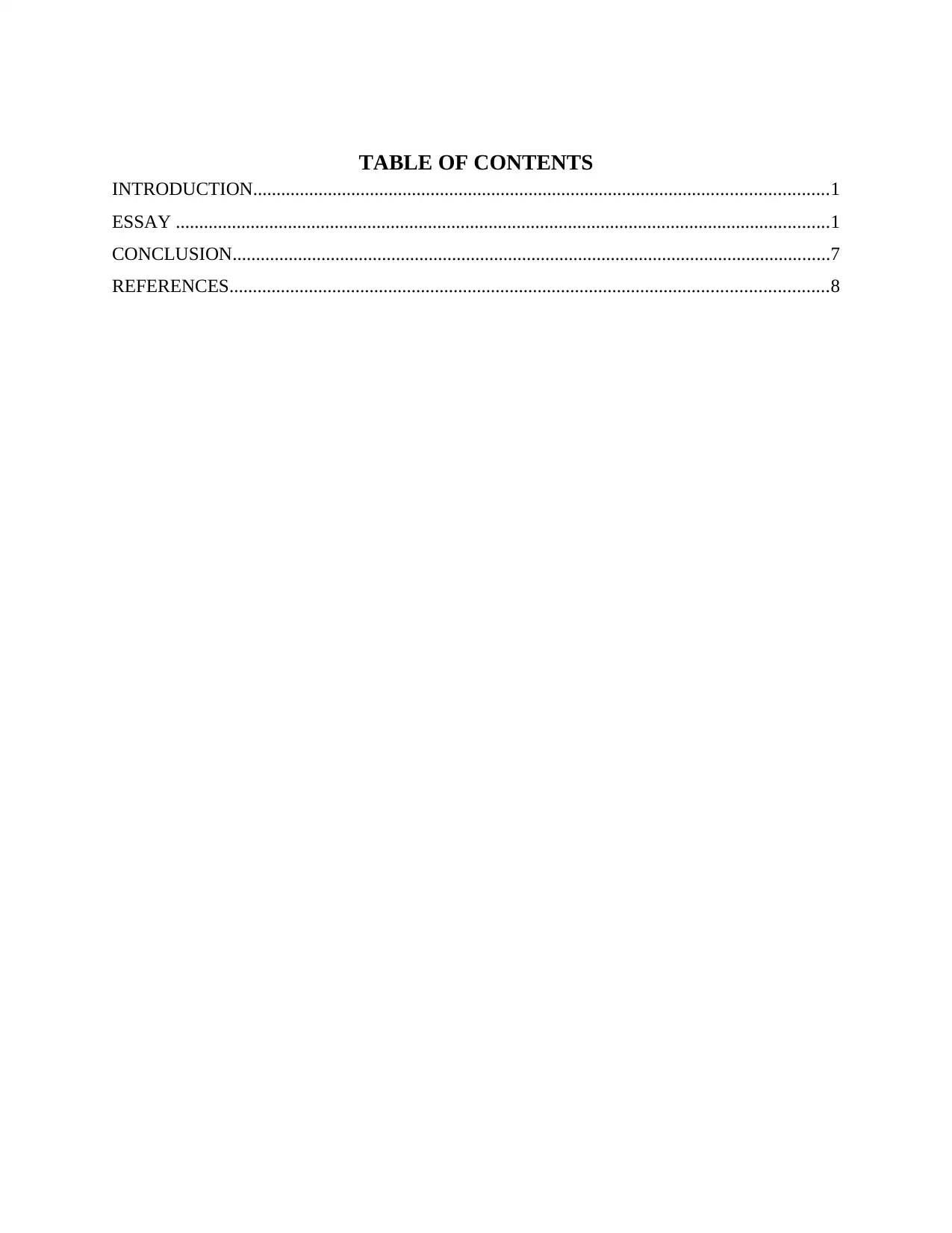
TABLE OF CONTENTS
INTRODUCTION...........................................................................................................................1
ESSAY ............................................................................................................................................1
CONCLUSION................................................................................................................................7
REFERENCES................................................................................................................................8
INTRODUCTION...........................................................................................................................1
ESSAY ............................................................................................................................................1
CONCLUSION................................................................................................................................7
REFERENCES................................................................................................................................8
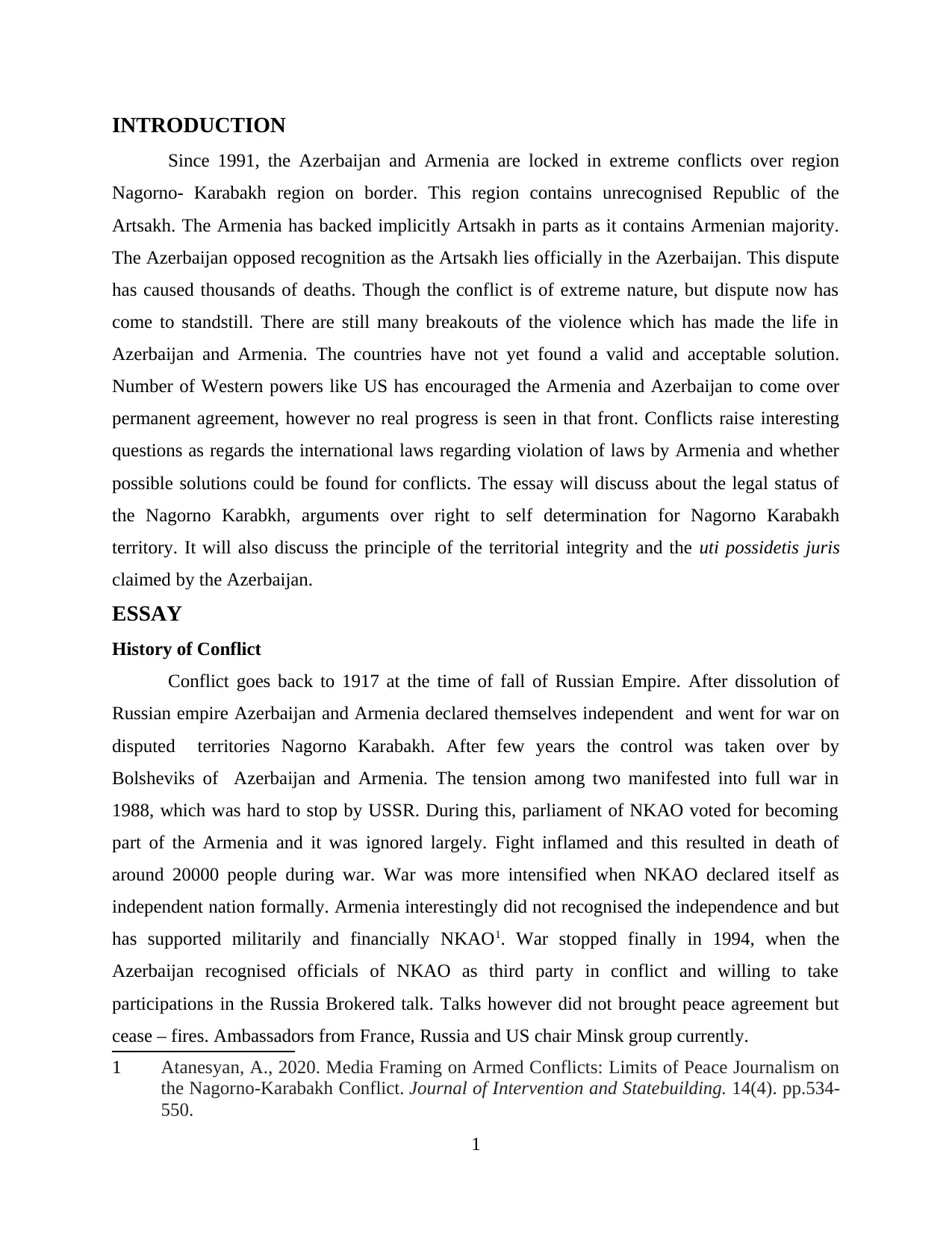
INTRODUCTION
Since 1991, the Azerbaijan and Armenia are locked in extreme conflicts over region
Nagorno- Karabakh region on border. This region contains unrecognised Republic of the
Artsakh. The Armenia has backed implicitly Artsakh in parts as it contains Armenian majority.
The Azerbaijan opposed recognition as the Artsakh lies officially in the Azerbaijan. This dispute
has caused thousands of deaths. Though the conflict is of extreme nature, but dispute now has
come to standstill. There are still many breakouts of the violence which has made the life in
Azerbaijan and Armenia. The countries have not yet found a valid and acceptable solution.
Number of Western powers like US has encouraged the Armenia and Azerbaijan to come over
permanent agreement, however no real progress is seen in that front. Conflicts raise interesting
questions as regards the international laws regarding violation of laws by Armenia and whether
possible solutions could be found for conflicts. The essay will discuss about the legal status of
the Nagorno Karabkh, arguments over right to self determination for Nagorno Karabakh
territory. It will also discuss the principle of the territorial integrity and the uti possidetis juris
claimed by the Azerbaijan.
ESSAY
History of Conflict
Conflict goes back to 1917 at the time of fall of Russian Empire. After dissolution of
Russian empire Azerbaijan and Armenia declared themselves independent and went for war on
disputed territories Nagorno Karabakh. After few years the control was taken over by
Bolsheviks of Azerbaijan and Armenia. The tension among two manifested into full war in
1988, which was hard to stop by USSR. During this, parliament of NKAO voted for becoming
part of the Armenia and it was ignored largely. Fight inflamed and this resulted in death of
around 20000 people during war. War was more intensified when NKAO declared itself as
independent nation formally. Armenia interestingly did not recognised the independence and but
has supported militarily and financially NKAO1. War stopped finally in 1994, when the
Azerbaijan recognised officials of NKAO as third party in conflict and willing to take
participations in the Russia Brokered talk. Talks however did not brought peace agreement but
cease – fires. Ambassadors from France, Russia and US chair Minsk group currently.
1 Atanesyan, A., 2020. Media Framing on Armed Conflicts: Limits of Peace Journalism on
the Nagorno-Karabakh Conflict. Journal of Intervention and Statebuilding. 14(4). pp.534-
550.
1
Since 1991, the Azerbaijan and Armenia are locked in extreme conflicts over region
Nagorno- Karabakh region on border. This region contains unrecognised Republic of the
Artsakh. The Armenia has backed implicitly Artsakh in parts as it contains Armenian majority.
The Azerbaijan opposed recognition as the Artsakh lies officially in the Azerbaijan. This dispute
has caused thousands of deaths. Though the conflict is of extreme nature, but dispute now has
come to standstill. There are still many breakouts of the violence which has made the life in
Azerbaijan and Armenia. The countries have not yet found a valid and acceptable solution.
Number of Western powers like US has encouraged the Armenia and Azerbaijan to come over
permanent agreement, however no real progress is seen in that front. Conflicts raise interesting
questions as regards the international laws regarding violation of laws by Armenia and whether
possible solutions could be found for conflicts. The essay will discuss about the legal status of
the Nagorno Karabkh, arguments over right to self determination for Nagorno Karabakh
territory. It will also discuss the principle of the territorial integrity and the uti possidetis juris
claimed by the Azerbaijan.
ESSAY
History of Conflict
Conflict goes back to 1917 at the time of fall of Russian Empire. After dissolution of
Russian empire Azerbaijan and Armenia declared themselves independent and went for war on
disputed territories Nagorno Karabakh. After few years the control was taken over by
Bolsheviks of Azerbaijan and Armenia. The tension among two manifested into full war in
1988, which was hard to stop by USSR. During this, parliament of NKAO voted for becoming
part of the Armenia and it was ignored largely. Fight inflamed and this resulted in death of
around 20000 people during war. War was more intensified when NKAO declared itself as
independent nation formally. Armenia interestingly did not recognised the independence and but
has supported militarily and financially NKAO1. War stopped finally in 1994, when the
Azerbaijan recognised officials of NKAO as third party in conflict and willing to take
participations in the Russia Brokered talk. Talks however did not brought peace agreement but
cease – fires. Ambassadors from France, Russia and US chair Minsk group currently.
1 Atanesyan, A., 2020. Media Framing on Armed Conflicts: Limits of Peace Journalism on
the Nagorno-Karabakh Conflict. Journal of Intervention and Statebuilding. 14(4). pp.534-
550.
1
⊘ This is a preview!⊘
Do you want full access?
Subscribe today to unlock all pages.

Trusted by 1+ million students worldwide
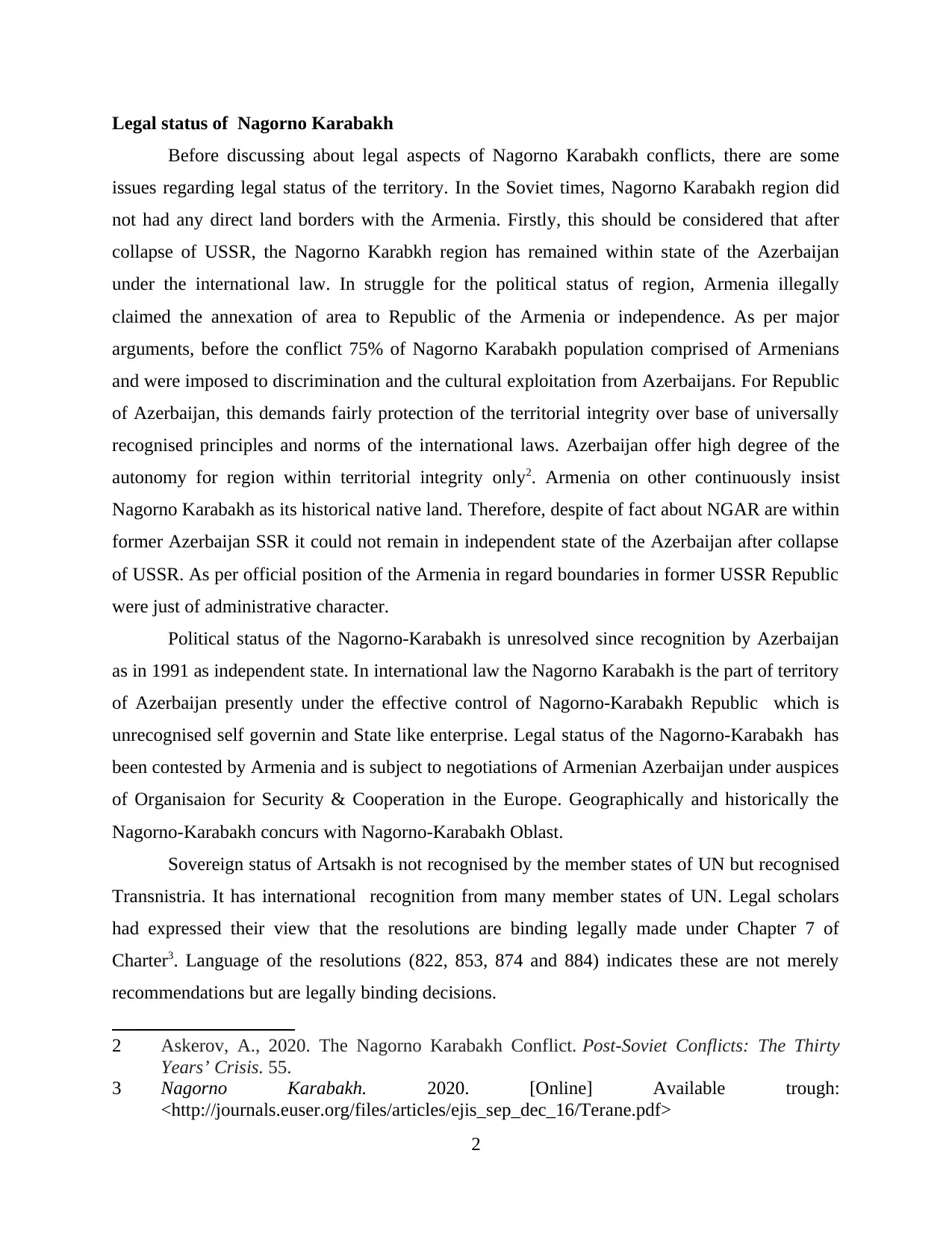
Legal status of Nagorno Karabakh
Before discussing about legal aspects of Nagorno Karabakh conflicts, there are some
issues regarding legal status of the territory. In the Soviet times, Nagorno Karabakh region did
not had any direct land borders with the Armenia. Firstly, this should be considered that after
collapse of USSR, the Nagorno Karabkh region has remained within state of the Azerbaijan
under the international law. In struggle for the political status of region, Armenia illegally
claimed the annexation of area to Republic of the Armenia or independence. As per major
arguments, before the conflict 75% of Nagorno Karabakh population comprised of Armenians
and were imposed to discrimination and the cultural exploitation from Azerbaijans. For Republic
of Azerbaijan, this demands fairly protection of the territorial integrity over base of universally
recognised principles and norms of the international laws. Azerbaijan offer high degree of the
autonomy for region within territorial integrity only2. Armenia on other continuously insist
Nagorno Karabakh as its historical native land. Therefore, despite of fact about NGAR are within
former Azerbaijan SSR it could not remain in independent state of the Azerbaijan after collapse
of USSR. As per official position of the Armenia in regard boundaries in former USSR Republic
were just of administrative character.
Political status of the Nagorno-Karabakh is unresolved since recognition by Azerbaijan
as in 1991 as independent state. In international law the Nagorno Karabakh is the part of territory
of Azerbaijan presently under the effective control of Nagorno-Karabakh Republic which is
unrecognised self governin and State like enterprise. Legal status of the Nagorno-Karabakh has
been contested by Armenia and is subject to negotiations of Armenian Azerbaijan under auspices
of Organisaion for Security & Cooperation in the Europe. Geographically and historically the
Nagorno-Karabakh concurs with Nagorno-Karabakh Oblast.
Sovereign status of Artsakh is not recognised by the member states of UN but recognised
Transnistria. It has international recognition from many member states of UN. Legal scholars
had expressed their view that the resolutions are binding legally made under Chapter 7 of
Charter3. Language of the resolutions (822, 853, 874 and 884) indicates these are not merely
recommendations but are legally binding decisions.
2 Askerov, A., 2020. The Nagorno Karabakh Conflict. Post-Soviet Conflicts: The Thirty
Years’ Crisis. 55.
3 Nagorno Karabakh. 2020. [Online] Available trough:
<http://journals.euser.org/files/articles/ejis_sep_dec_16/Terane.pdf>
2
Before discussing about legal aspects of Nagorno Karabakh conflicts, there are some
issues regarding legal status of the territory. In the Soviet times, Nagorno Karabakh region did
not had any direct land borders with the Armenia. Firstly, this should be considered that after
collapse of USSR, the Nagorno Karabkh region has remained within state of the Azerbaijan
under the international law. In struggle for the political status of region, Armenia illegally
claimed the annexation of area to Republic of the Armenia or independence. As per major
arguments, before the conflict 75% of Nagorno Karabakh population comprised of Armenians
and were imposed to discrimination and the cultural exploitation from Azerbaijans. For Republic
of Azerbaijan, this demands fairly protection of the territorial integrity over base of universally
recognised principles and norms of the international laws. Azerbaijan offer high degree of the
autonomy for region within territorial integrity only2. Armenia on other continuously insist
Nagorno Karabakh as its historical native land. Therefore, despite of fact about NGAR are within
former Azerbaijan SSR it could not remain in independent state of the Azerbaijan after collapse
of USSR. As per official position of the Armenia in regard boundaries in former USSR Republic
were just of administrative character.
Political status of the Nagorno-Karabakh is unresolved since recognition by Azerbaijan
as in 1991 as independent state. In international law the Nagorno Karabakh is the part of territory
of Azerbaijan presently under the effective control of Nagorno-Karabakh Republic which is
unrecognised self governin and State like enterprise. Legal status of the Nagorno-Karabakh has
been contested by Armenia and is subject to negotiations of Armenian Azerbaijan under auspices
of Organisaion for Security & Cooperation in the Europe. Geographically and historically the
Nagorno-Karabakh concurs with Nagorno-Karabakh Oblast.
Sovereign status of Artsakh is not recognised by the member states of UN but recognised
Transnistria. It has international recognition from many member states of UN. Legal scholars
had expressed their view that the resolutions are binding legally made under Chapter 7 of
Charter3. Language of the resolutions (822, 853, 874 and 884) indicates these are not merely
recommendations but are legally binding decisions.
2 Askerov, A., 2020. The Nagorno Karabakh Conflict. Post-Soviet Conflicts: The Thirty
Years’ Crisis. 55.
3 Nagorno Karabakh. 2020. [Online] Available trough:
<http://journals.euser.org/files/articles/ejis_sep_dec_16/Terane.pdf>
2
Paraphrase This Document
Need a fresh take? Get an instant paraphrase of this document with our AI Paraphraser
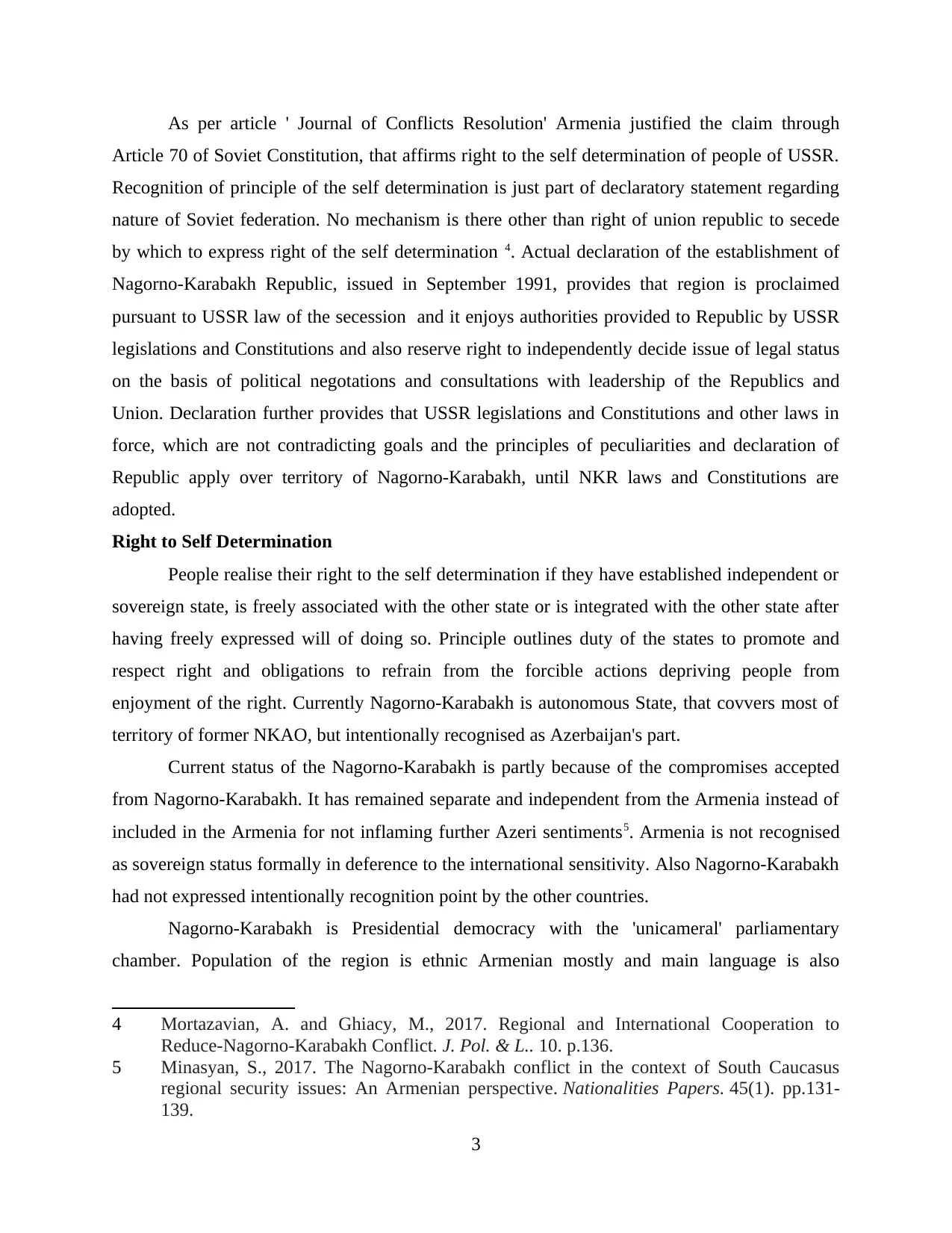
As per article ' Journal of Conflicts Resolution' Armenia justified the claim through
Article 70 of Soviet Constitution, that affirms right to the self determination of people of USSR.
Recognition of principle of the self determination is just part of declaratory statement regarding
nature of Soviet federation. No mechanism is there other than right of union republic to secede
by which to express right of the self determination 4. Actual declaration of the establishment of
Nagorno-Karabakh Republic, issued in September 1991, provides that region is proclaimed
pursuant to USSR law of the secession and it enjoys authorities provided to Republic by USSR
legislations and Constitutions and also reserve right to independently decide issue of legal status
on the basis of political negotations and consultations with leadership of the Republics and
Union. Declaration further provides that USSR legislations and Constitutions and other laws in
force, which are not contradicting goals and the principles of peculiarities and declaration of
Republic apply over territory of Nagorno-Karabakh, until NKR laws and Constitutions are
adopted.
Right to Self Determination
People realise their right to the self determination if they have established independent or
sovereign state, is freely associated with the other state or is integrated with the other state after
having freely expressed will of doing so. Principle outlines duty of the states to promote and
respect right and obligations to refrain from the forcible actions depriving people from
enjoyment of the right. Currently Nagorno-Karabakh is autonomous State, that covvers most of
territory of former NKAO, but intentionally recognised as Azerbaijan's part.
Current status of the Nagorno-Karabakh is partly because of the compromises accepted
from Nagorno-Karabakh. It has remained separate and independent from the Armenia instead of
included in the Armenia for not inflaming further Azeri sentiments5. Armenia is not recognised
as sovereign status formally in deference to the international sensitivity. Also Nagorno-Karabakh
had not expressed intentionally recognition point by the other countries.
Nagorno-Karabakh is Presidential democracy with the 'unicameral' parliamentary
chamber. Population of the region is ethnic Armenian mostly and main language is also
4 Mortazavian, A. and Ghiacy, M., 2017. Regional and International Cooperation to
Reduce-Nagorno-Karabakh Conflict. J. Pol. & L.. 10. p.136.
5 Minasyan, S., 2017. The Nagorno-Karabakh conflict in the context of South Caucasus
regional security issues: An Armenian perspective. Nationalities Papers. 45(1). pp.131-
139.
3
Article 70 of Soviet Constitution, that affirms right to the self determination of people of USSR.
Recognition of principle of the self determination is just part of declaratory statement regarding
nature of Soviet federation. No mechanism is there other than right of union republic to secede
by which to express right of the self determination 4. Actual declaration of the establishment of
Nagorno-Karabakh Republic, issued in September 1991, provides that region is proclaimed
pursuant to USSR law of the secession and it enjoys authorities provided to Republic by USSR
legislations and Constitutions and also reserve right to independently decide issue of legal status
on the basis of political negotations and consultations with leadership of the Republics and
Union. Declaration further provides that USSR legislations and Constitutions and other laws in
force, which are not contradicting goals and the principles of peculiarities and declaration of
Republic apply over territory of Nagorno-Karabakh, until NKR laws and Constitutions are
adopted.
Right to Self Determination
People realise their right to the self determination if they have established independent or
sovereign state, is freely associated with the other state or is integrated with the other state after
having freely expressed will of doing so. Principle outlines duty of the states to promote and
respect right and obligations to refrain from the forcible actions depriving people from
enjoyment of the right. Currently Nagorno-Karabakh is autonomous State, that covvers most of
territory of former NKAO, but intentionally recognised as Azerbaijan's part.
Current status of the Nagorno-Karabakh is partly because of the compromises accepted
from Nagorno-Karabakh. It has remained separate and independent from the Armenia instead of
included in the Armenia for not inflaming further Azeri sentiments5. Armenia is not recognised
as sovereign status formally in deference to the international sensitivity. Also Nagorno-Karabakh
had not expressed intentionally recognition point by the other countries.
Nagorno-Karabakh is Presidential democracy with the 'unicameral' parliamentary
chamber. Population of the region is ethnic Armenian mostly and main language is also
4 Mortazavian, A. and Ghiacy, M., 2017. Regional and International Cooperation to
Reduce-Nagorno-Karabakh Conflict. J. Pol. & L.. 10. p.136.
5 Minasyan, S., 2017. The Nagorno-Karabakh conflict in the context of South Caucasus
regional security issues: An Armenian perspective. Nationalities Papers. 45(1). pp.131-
139.
3
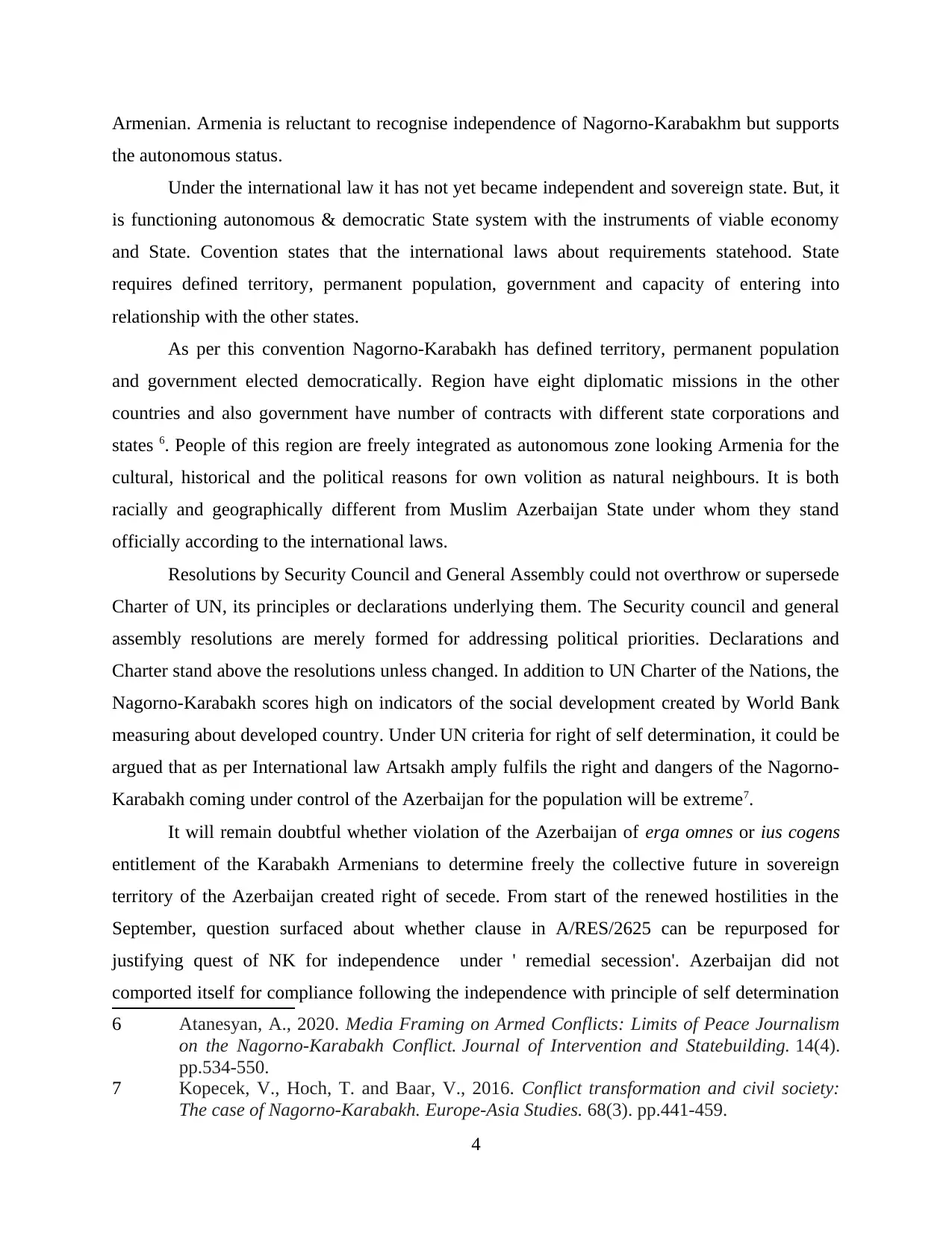
Armenian. Armenia is reluctant to recognise independence of Nagorno-Karabakhm but supports
the autonomous status.
Under the international law it has not yet became independent and sovereign state. But, it
is functioning autonomous & democratic State system with the instruments of viable economy
and State. Covention states that the international laws about requirements statehood. State
requires defined territory, permanent population, government and capacity of entering into
relationship with the other states.
As per this convention Nagorno-Karabakh has defined territory, permanent population
and government elected democratically. Region have eight diplomatic missions in the other
countries and also government have number of contracts with different state corporations and
states 6. People of this region are freely integrated as autonomous zone looking Armenia for the
cultural, historical and the political reasons for own volition as natural neighbours. It is both
racially and geographically different from Muslim Azerbaijan State under whom they stand
officially according to the international laws.
Resolutions by Security Council and General Assembly could not overthrow or supersede
Charter of UN, its principles or declarations underlying them. The Security council and general
assembly resolutions are merely formed for addressing political priorities. Declarations and
Charter stand above the resolutions unless changed. In addition to UN Charter of the Nations, the
Nagorno-Karabakh scores high on indicators of the social development created by World Bank
measuring about developed country. Under UN criteria for right of self determination, it could be
argued that as per International law Artsakh amply fulfils the right and dangers of the Nagorno-
Karabakh coming under control of the Azerbaijan for the population will be extreme7.
It will remain doubtful whether violation of the Azerbaijan of erga omnes or ius cogens
entitlement of the Karabakh Armenians to determine freely the collective future in sovereign
territory of the Azerbaijan created right of secede. From start of the renewed hostilities in the
September, question surfaced about whether clause in A/RES/2625 can be repurposed for
justifying quest of NK for independence under ' remedial secession'. Azerbaijan did not
comported itself for compliance following the independence with principle of self determination
6 Atanesyan, A., 2020. Media Framing on Armed Conflicts: Limits of Peace Journalism
on the Nagorno-Karabakh Conflict. Journal of Intervention and Statebuilding. 14(4).
pp.534-550.
7 Kopecek, V., Hoch, T. and Baar, V., 2016. Conflict transformation and civil society:
The case of Nagorno-Karabakh. Europe-Asia Studies. 68(3). pp.441-459.
4
the autonomous status.
Under the international law it has not yet became independent and sovereign state. But, it
is functioning autonomous & democratic State system with the instruments of viable economy
and State. Covention states that the international laws about requirements statehood. State
requires defined territory, permanent population, government and capacity of entering into
relationship with the other states.
As per this convention Nagorno-Karabakh has defined territory, permanent population
and government elected democratically. Region have eight diplomatic missions in the other
countries and also government have number of contracts with different state corporations and
states 6. People of this region are freely integrated as autonomous zone looking Armenia for the
cultural, historical and the political reasons for own volition as natural neighbours. It is both
racially and geographically different from Muslim Azerbaijan State under whom they stand
officially according to the international laws.
Resolutions by Security Council and General Assembly could not overthrow or supersede
Charter of UN, its principles or declarations underlying them. The Security council and general
assembly resolutions are merely formed for addressing political priorities. Declarations and
Charter stand above the resolutions unless changed. In addition to UN Charter of the Nations, the
Nagorno-Karabakh scores high on indicators of the social development created by World Bank
measuring about developed country. Under UN criteria for right of self determination, it could be
argued that as per International law Artsakh amply fulfils the right and dangers of the Nagorno-
Karabakh coming under control of the Azerbaijan for the population will be extreme7.
It will remain doubtful whether violation of the Azerbaijan of erga omnes or ius cogens
entitlement of the Karabakh Armenians to determine freely the collective future in sovereign
territory of the Azerbaijan created right of secede. From start of the renewed hostilities in the
September, question surfaced about whether clause in A/RES/2625 can be repurposed for
justifying quest of NK for independence under ' remedial secession'. Azerbaijan did not
comported itself for compliance following the independence with principle of self determination
6 Atanesyan, A., 2020. Media Framing on Armed Conflicts: Limits of Peace Journalism
on the Nagorno-Karabakh Conflict. Journal of Intervention and Statebuilding. 14(4).
pp.534-550.
7 Kopecek, V., Hoch, T. and Baar, V., 2016. Conflict transformation and civil society:
The case of Nagorno-Karabakh. Europe-Asia Studies. 68(3). pp.441-459.
4
⊘ This is a preview!⊘
Do you want full access?
Subscribe today to unlock all pages.

Trusted by 1+ million students worldwide
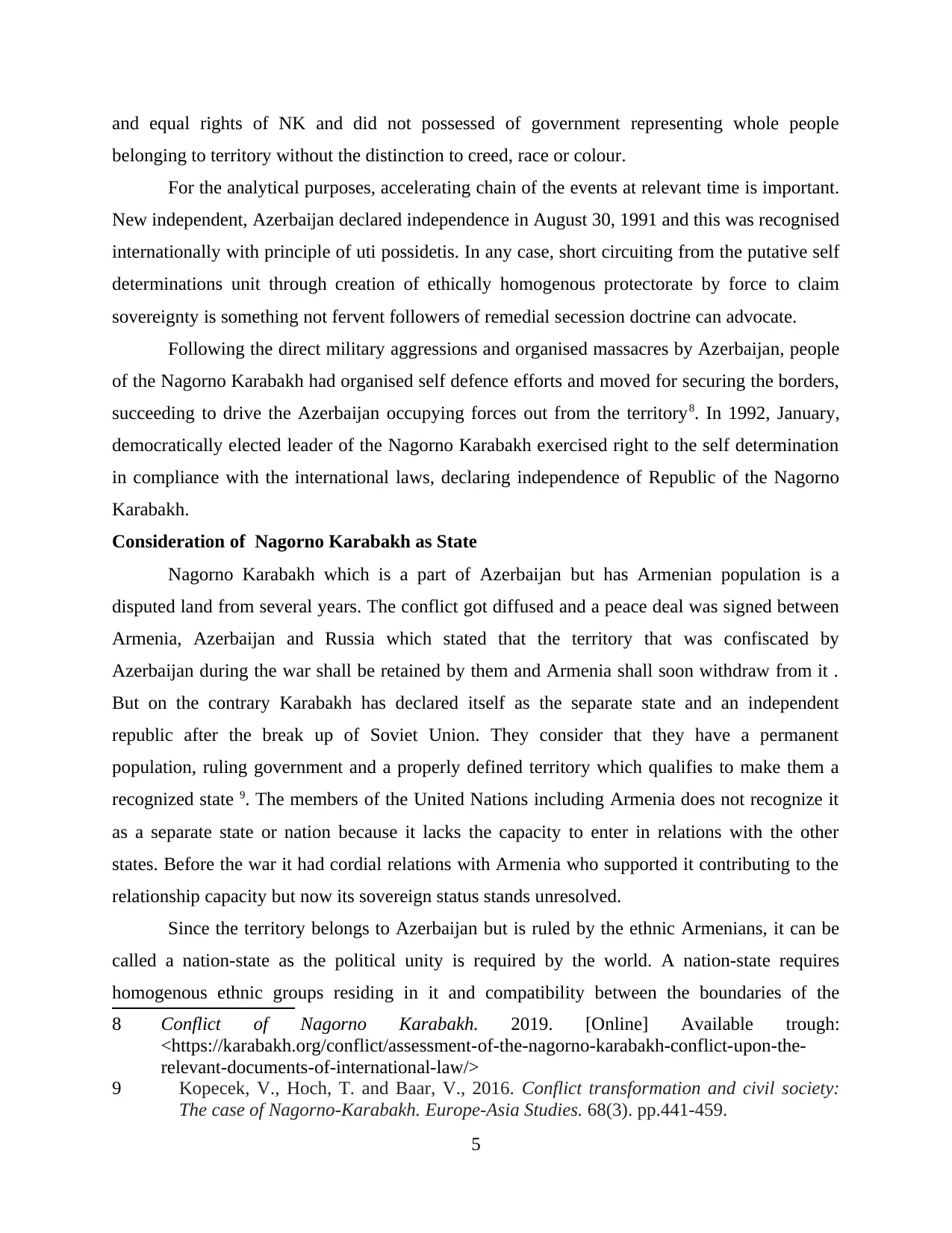
and equal rights of NK and did not possessed of government representing whole people
belonging to territory without the distinction to creed, race or colour.
For the analytical purposes, accelerating chain of the events at relevant time is important.
New independent, Azerbaijan declared independence in August 30, 1991 and this was recognised
internationally with principle of uti possidetis. In any case, short circuiting from the putative self
determinations unit through creation of ethically homogenous protectorate by force to claim
sovereignty is something not fervent followers of remedial secession doctrine can advocate.
Following the direct military aggressions and organised massacres by Azerbaijan, people
of the Nagorno Karabakh had organised self defence efforts and moved for securing the borders,
succeeding to drive the Azerbaijan occupying forces out from the territory8. In 1992, January,
democratically elected leader of the Nagorno Karabakh exercised right to the self determination
in compliance with the international laws, declaring independence of Republic of the Nagorno
Karabakh.
Consideration of Nagorno Karabakh as State
Nagorno Karabakh which is a part of Azerbaijan but has Armenian population is a
disputed land from several years. The conflict got diffused and a peace deal was signed between
Armenia, Azerbaijan and Russia which stated that the territory that was confiscated by
Azerbaijan during the war shall be retained by them and Armenia shall soon withdraw from it .
But on the contrary Karabakh has declared itself as the separate state and an independent
republic after the break up of Soviet Union. They consider that they have a permanent
population, ruling government and a properly defined territory which qualifies to make them a
recognized state 9. The members of the United Nations including Armenia does not recognize it
as a separate state or nation because it lacks the capacity to enter in relations with the other
states. Before the war it had cordial relations with Armenia who supported it contributing to the
relationship capacity but now its sovereign status stands unresolved.
Since the territory belongs to Azerbaijan but is ruled by the ethnic Armenians, it can be
called a nation-state as the political unity is required by the world. A nation-state requires
homogenous ethnic groups residing in it and compatibility between the boundaries of the
8 Conflict of Nagorno Karabakh. 2019. [Online] Available trough:
<https://karabakh.org/conflict/assessment-of-the-nagorno-karabakh-conflict-upon-the-
relevant-documents-of-international-law/>
9 Kopecek, V., Hoch, T. and Baar, V., 2016. Conflict transformation and civil society:
The case of Nagorno-Karabakh. Europe-Asia Studies. 68(3). pp.441-459.
5
belonging to territory without the distinction to creed, race or colour.
For the analytical purposes, accelerating chain of the events at relevant time is important.
New independent, Azerbaijan declared independence in August 30, 1991 and this was recognised
internationally with principle of uti possidetis. In any case, short circuiting from the putative self
determinations unit through creation of ethically homogenous protectorate by force to claim
sovereignty is something not fervent followers of remedial secession doctrine can advocate.
Following the direct military aggressions and organised massacres by Azerbaijan, people
of the Nagorno Karabakh had organised self defence efforts and moved for securing the borders,
succeeding to drive the Azerbaijan occupying forces out from the territory8. In 1992, January,
democratically elected leader of the Nagorno Karabakh exercised right to the self determination
in compliance with the international laws, declaring independence of Republic of the Nagorno
Karabakh.
Consideration of Nagorno Karabakh as State
Nagorno Karabakh which is a part of Azerbaijan but has Armenian population is a
disputed land from several years. The conflict got diffused and a peace deal was signed between
Armenia, Azerbaijan and Russia which stated that the territory that was confiscated by
Azerbaijan during the war shall be retained by them and Armenia shall soon withdraw from it .
But on the contrary Karabakh has declared itself as the separate state and an independent
republic after the break up of Soviet Union. They consider that they have a permanent
population, ruling government and a properly defined territory which qualifies to make them a
recognized state 9. The members of the United Nations including Armenia does not recognize it
as a separate state or nation because it lacks the capacity to enter in relations with the other
states. Before the war it had cordial relations with Armenia who supported it contributing to the
relationship capacity but now its sovereign status stands unresolved.
Since the territory belongs to Azerbaijan but is ruled by the ethnic Armenians, it can be
called a nation-state as the political unity is required by the world. A nation-state requires
homogenous ethnic groups residing in it and compatibility between the boundaries of the
8 Conflict of Nagorno Karabakh. 2019. [Online] Available trough:
<https://karabakh.org/conflict/assessment-of-the-nagorno-karabakh-conflict-upon-the-
relevant-documents-of-international-law/>
9 Kopecek, V., Hoch, T. and Baar, V., 2016. Conflict transformation and civil society:
The case of Nagorno-Karabakh. Europe-Asia Studies. 68(3). pp.441-459.
5
Paraphrase This Document
Need a fresh take? Get an instant paraphrase of this document with our AI Paraphraser
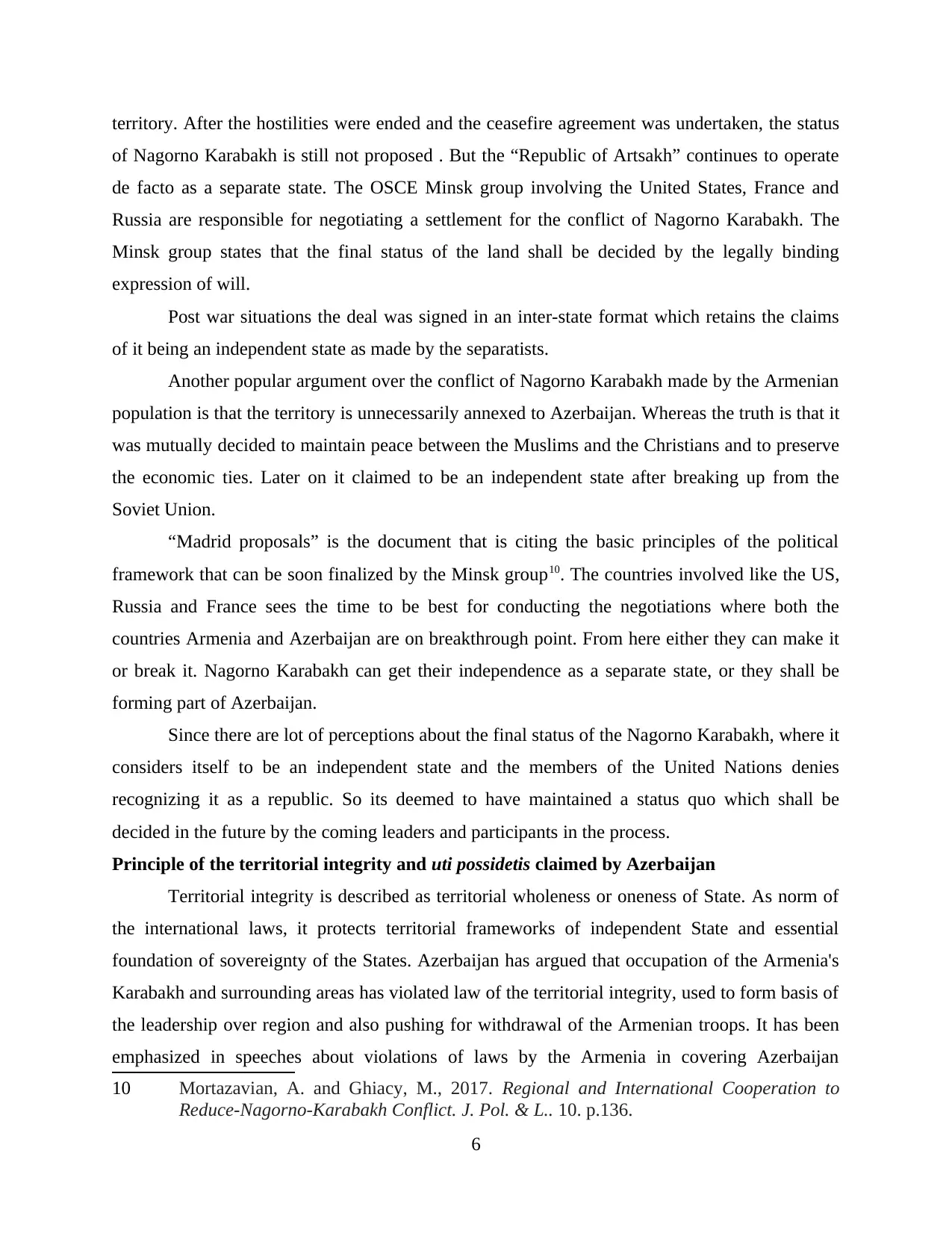
territory. After the hostilities were ended and the ceasefire agreement was undertaken, the status
of Nagorno Karabakh is still not proposed . But the “Republic of Artsakh” continues to operate
de facto as a separate state. The OSCE Minsk group involving the United States, France and
Russia are responsible for negotiating a settlement for the conflict of Nagorno Karabakh. The
Minsk group states that the final status of the land shall be decided by the legally binding
expression of will.
Post war situations the deal was signed in an inter-state format which retains the claims
of it being an independent state as made by the separatists.
Another popular argument over the conflict of Nagorno Karabakh made by the Armenian
population is that the territory is unnecessarily annexed to Azerbaijan. Whereas the truth is that it
was mutually decided to maintain peace between the Muslims and the Christians and to preserve
the economic ties. Later on it claimed to be an independent state after breaking up from the
Soviet Union.
“Madrid proposals” is the document that is citing the basic principles of the political
framework that can be soon finalized by the Minsk group10. The countries involved like the US,
Russia and France sees the time to be best for conducting the negotiations where both the
countries Armenia and Azerbaijan are on breakthrough point. From here either they can make it
or break it. Nagorno Karabakh can get their independence as a separate state, or they shall be
forming part of Azerbaijan.
Since there are lot of perceptions about the final status of the Nagorno Karabakh, where it
considers itself to be an independent state and the members of the United Nations denies
recognizing it as a republic. So its deemed to have maintained a status quo which shall be
decided in the future by the coming leaders and participants in the process.
Principle of the territorial integrity and uti possidetis claimed by Azerbaijan
Territorial integrity is described as territorial wholeness or oneness of State. As norm of
the international laws, it protects territorial frameworks of independent State and essential
foundation of sovereignty of the States. Azerbaijan has argued that occupation of the Armenia's
Karabakh and surrounding areas has violated law of the territorial integrity, used to form basis of
the leadership over region and also pushing for withdrawal of the Armenian troops. It has been
emphasized in speeches about violations of laws by the Armenia in covering Azerbaijan
10 Mortazavian, A. and Ghiacy, M., 2017. Regional and International Cooperation to
Reduce-Nagorno-Karabakh Conflict. J. Pol. & L.. 10. p.136.
6
of Nagorno Karabakh is still not proposed . But the “Republic of Artsakh” continues to operate
de facto as a separate state. The OSCE Minsk group involving the United States, France and
Russia are responsible for negotiating a settlement for the conflict of Nagorno Karabakh. The
Minsk group states that the final status of the land shall be decided by the legally binding
expression of will.
Post war situations the deal was signed in an inter-state format which retains the claims
of it being an independent state as made by the separatists.
Another popular argument over the conflict of Nagorno Karabakh made by the Armenian
population is that the territory is unnecessarily annexed to Azerbaijan. Whereas the truth is that it
was mutually decided to maintain peace between the Muslims and the Christians and to preserve
the economic ties. Later on it claimed to be an independent state after breaking up from the
Soviet Union.
“Madrid proposals” is the document that is citing the basic principles of the political
framework that can be soon finalized by the Minsk group10. The countries involved like the US,
Russia and France sees the time to be best for conducting the negotiations where both the
countries Armenia and Azerbaijan are on breakthrough point. From here either they can make it
or break it. Nagorno Karabakh can get their independence as a separate state, or they shall be
forming part of Azerbaijan.
Since there are lot of perceptions about the final status of the Nagorno Karabakh, where it
considers itself to be an independent state and the members of the United Nations denies
recognizing it as a republic. So its deemed to have maintained a status quo which shall be
decided in the future by the coming leaders and participants in the process.
Principle of the territorial integrity and uti possidetis claimed by Azerbaijan
Territorial integrity is described as territorial wholeness or oneness of State. As norm of
the international laws, it protects territorial frameworks of independent State and essential
foundation of sovereignty of the States. Azerbaijan has argued that occupation of the Armenia's
Karabakh and surrounding areas has violated law of the territorial integrity, used to form basis of
the leadership over region and also pushing for withdrawal of the Armenian troops. It has been
emphasized in speeches about violations of laws by the Armenia in covering Azerbaijan
10 Mortazavian, A. and Ghiacy, M., 2017. Regional and International Cooperation to
Reduce-Nagorno-Karabakh Conflict. J. Pol. & L.. 10. p.136.
6
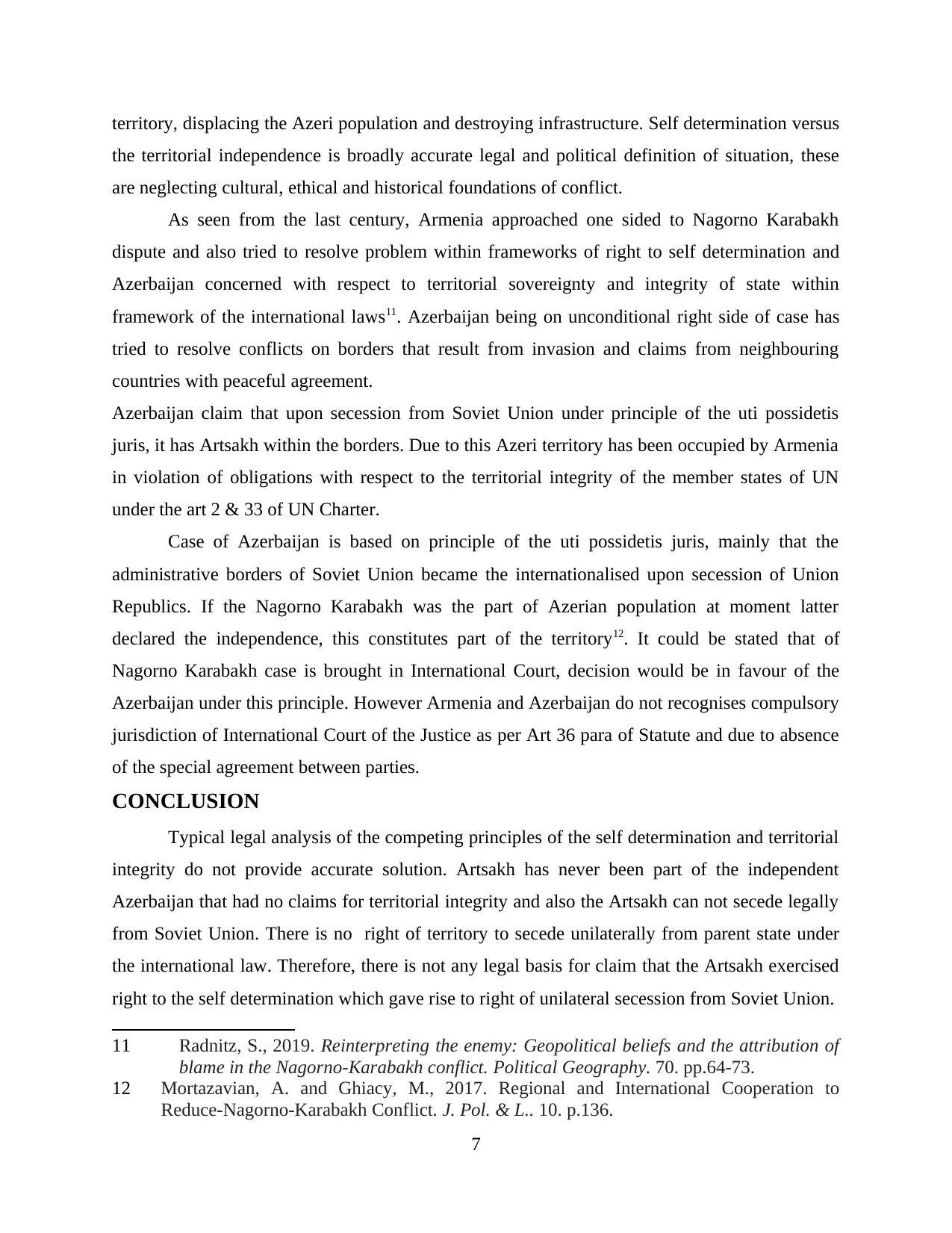
territory, displacing the Azeri population and destroying infrastructure. Self determination versus
the territorial independence is broadly accurate legal and political definition of situation, these
are neglecting cultural, ethical and historical foundations of conflict.
As seen from the last century, Armenia approached one sided to Nagorno Karabakh
dispute and also tried to resolve problem within frameworks of right to self determination and
Azerbaijan concerned with respect to territorial sovereignty and integrity of state within
framework of the international laws11. Azerbaijan being on unconditional right side of case has
tried to resolve conflicts on borders that result from invasion and claims from neighbouring
countries with peaceful agreement.
Azerbaijan claim that upon secession from Soviet Union under principle of the uti possidetis
juris, it has Artsakh within the borders. Due to this Azeri territory has been occupied by Armenia
in violation of obligations with respect to the territorial integrity of the member states of UN
under the art 2 & 33 of UN Charter.
Case of Azerbaijan is based on principle of the uti possidetis juris, mainly that the
administrative borders of Soviet Union became the internationalised upon secession of Union
Republics. If the Nagorno Karabakh was the part of Azerian population at moment latter
declared the independence, this constitutes part of the territory12. It could be stated that of
Nagorno Karabakh case is brought in International Court, decision would be in favour of the
Azerbaijan under this principle. However Armenia and Azerbaijan do not recognises compulsory
jurisdiction of International Court of the Justice as per Art 36 para of Statute and due to absence
of the special agreement between parties.
CONCLUSION
Typical legal analysis of the competing principles of the self determination and territorial
integrity do not provide accurate solution. Artsakh has never been part of the independent
Azerbaijan that had no claims for territorial integrity and also the Artsakh can not secede legally
from Soviet Union. There is no right of territory to secede unilaterally from parent state under
the international law. Therefore, there is not any legal basis for claim that the Artsakh exercised
right to the self determination which gave rise to right of unilateral secession from Soviet Union.
11 Radnitz, S., 2019. Reinterpreting the enemy: Geopolitical beliefs and the attribution of
blame in the Nagorno-Karabakh conflict. Political Geography. 70. pp.64-73.
12 Mortazavian, A. and Ghiacy, M., 2017. Regional and International Cooperation to
Reduce-Nagorno-Karabakh Conflict. J. Pol. & L.. 10. p.136.
7
the territorial independence is broadly accurate legal and political definition of situation, these
are neglecting cultural, ethical and historical foundations of conflict.
As seen from the last century, Armenia approached one sided to Nagorno Karabakh
dispute and also tried to resolve problem within frameworks of right to self determination and
Azerbaijan concerned with respect to territorial sovereignty and integrity of state within
framework of the international laws11. Azerbaijan being on unconditional right side of case has
tried to resolve conflicts on borders that result from invasion and claims from neighbouring
countries with peaceful agreement.
Azerbaijan claim that upon secession from Soviet Union under principle of the uti possidetis
juris, it has Artsakh within the borders. Due to this Azeri territory has been occupied by Armenia
in violation of obligations with respect to the territorial integrity of the member states of UN
under the art 2 & 33 of UN Charter.
Case of Azerbaijan is based on principle of the uti possidetis juris, mainly that the
administrative borders of Soviet Union became the internationalised upon secession of Union
Republics. If the Nagorno Karabakh was the part of Azerian population at moment latter
declared the independence, this constitutes part of the territory12. It could be stated that of
Nagorno Karabakh case is brought in International Court, decision would be in favour of the
Azerbaijan under this principle. However Armenia and Azerbaijan do not recognises compulsory
jurisdiction of International Court of the Justice as per Art 36 para of Statute and due to absence
of the special agreement between parties.
CONCLUSION
Typical legal analysis of the competing principles of the self determination and territorial
integrity do not provide accurate solution. Artsakh has never been part of the independent
Azerbaijan that had no claims for territorial integrity and also the Artsakh can not secede legally
from Soviet Union. There is no right of territory to secede unilaterally from parent state under
the international law. Therefore, there is not any legal basis for claim that the Artsakh exercised
right to the self determination which gave rise to right of unilateral secession from Soviet Union.
11 Radnitz, S., 2019. Reinterpreting the enemy: Geopolitical beliefs and the attribution of
blame in the Nagorno-Karabakh conflict. Political Geography. 70. pp.64-73.
12 Mortazavian, A. and Ghiacy, M., 2017. Regional and International Cooperation to
Reduce-Nagorno-Karabakh Conflict. J. Pol. & L.. 10. p.136.
7
⊘ This is a preview!⊘
Do you want full access?
Subscribe today to unlock all pages.

Trusted by 1+ million students worldwide
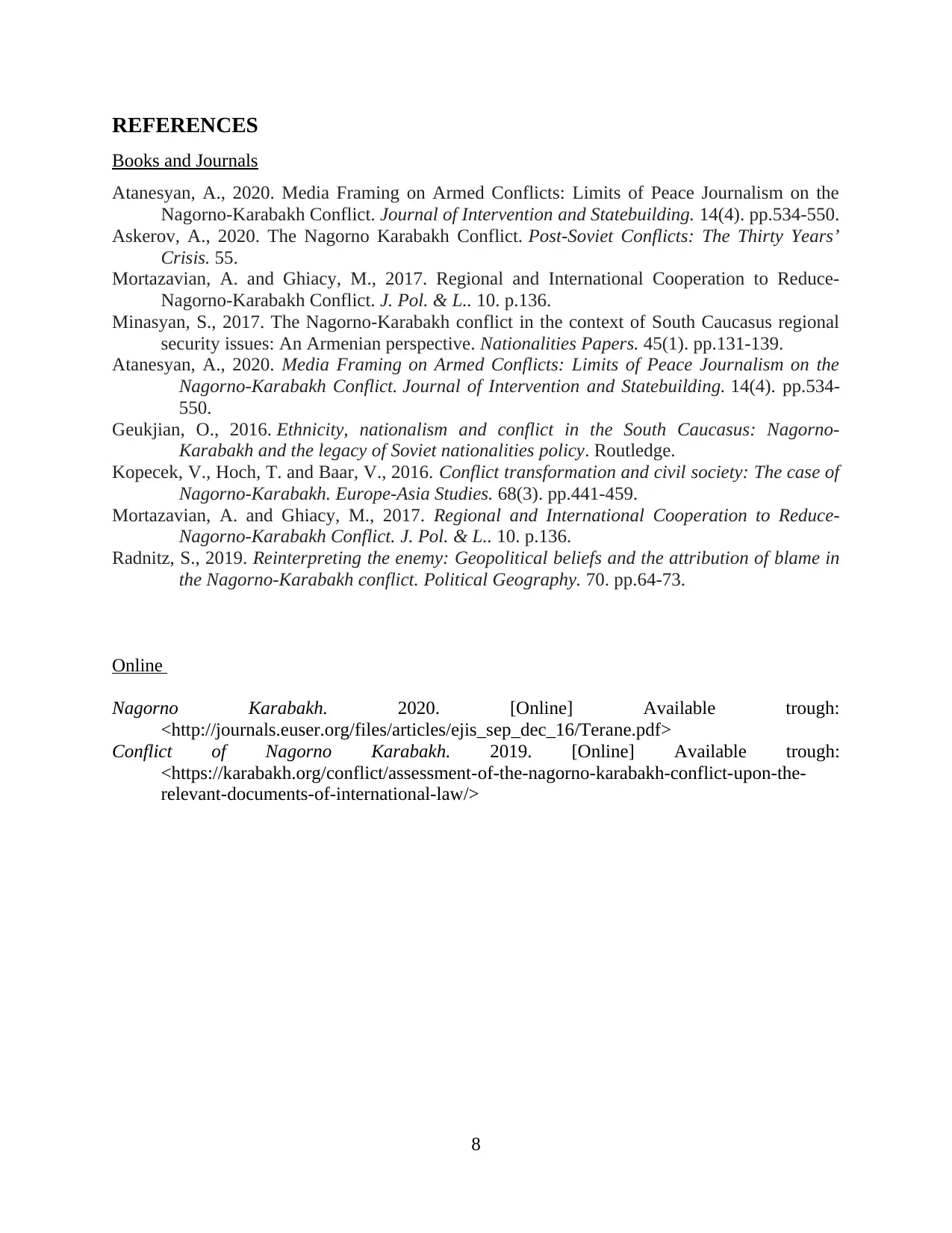
REFERENCES
Books and Journals
Atanesyan, A., 2020. Media Framing on Armed Conflicts: Limits of Peace Journalism on the
Nagorno-Karabakh Conflict. Journal of Intervention and Statebuilding. 14(4). pp.534-550.
Askerov, A., 2020. The Nagorno Karabakh Conflict. Post-Soviet Conflicts: The Thirty Years’
Crisis. 55.
Mortazavian, A. and Ghiacy, M., 2017. Regional and International Cooperation to Reduce-
Nagorno-Karabakh Conflict. J. Pol. & L.. 10. p.136.
Minasyan, S., 2017. The Nagorno-Karabakh conflict in the context of South Caucasus regional
security issues: An Armenian perspective. Nationalities Papers. 45(1). pp.131-139.
Atanesyan, A., 2020. Media Framing on Armed Conflicts: Limits of Peace Journalism on the
Nagorno-Karabakh Conflict. Journal of Intervention and Statebuilding. 14(4). pp.534-
550.
Geukjian, O., 2016. Ethnicity, nationalism and conflict in the South Caucasus: Nagorno-
Karabakh and the legacy of Soviet nationalities policy. Routledge.
Kopecek, V., Hoch, T. and Baar, V., 2016. Conflict transformation and civil society: The case of
Nagorno-Karabakh. Europe-Asia Studies. 68(3). pp.441-459.
Mortazavian, A. and Ghiacy, M., 2017. Regional and International Cooperation to Reduce-
Nagorno-Karabakh Conflict. J. Pol. & L.. 10. p.136.
Radnitz, S., 2019. Reinterpreting the enemy: Geopolitical beliefs and the attribution of blame in
the Nagorno-Karabakh conflict. Political Geography. 70. pp.64-73.
Online
Nagorno Karabakh. 2020. [Online] Available trough:
<http://journals.euser.org/files/articles/ejis_sep_dec_16/Terane.pdf>
Conflict of Nagorno Karabakh. 2019. [Online] Available trough:
<https://karabakh.org/conflict/assessment-of-the-nagorno-karabakh-conflict-upon-the-
relevant-documents-of-international-law/>
8
Books and Journals
Atanesyan, A., 2020. Media Framing on Armed Conflicts: Limits of Peace Journalism on the
Nagorno-Karabakh Conflict. Journal of Intervention and Statebuilding. 14(4). pp.534-550.
Askerov, A., 2020. The Nagorno Karabakh Conflict. Post-Soviet Conflicts: The Thirty Years’
Crisis. 55.
Mortazavian, A. and Ghiacy, M., 2017. Regional and International Cooperation to Reduce-
Nagorno-Karabakh Conflict. J. Pol. & L.. 10. p.136.
Minasyan, S., 2017. The Nagorno-Karabakh conflict in the context of South Caucasus regional
security issues: An Armenian perspective. Nationalities Papers. 45(1). pp.131-139.
Atanesyan, A., 2020. Media Framing on Armed Conflicts: Limits of Peace Journalism on the
Nagorno-Karabakh Conflict. Journal of Intervention and Statebuilding. 14(4). pp.534-
550.
Geukjian, O., 2016. Ethnicity, nationalism and conflict in the South Caucasus: Nagorno-
Karabakh and the legacy of Soviet nationalities policy. Routledge.
Kopecek, V., Hoch, T. and Baar, V., 2016. Conflict transformation and civil society: The case of
Nagorno-Karabakh. Europe-Asia Studies. 68(3). pp.441-459.
Mortazavian, A. and Ghiacy, M., 2017. Regional and International Cooperation to Reduce-
Nagorno-Karabakh Conflict. J. Pol. & L.. 10. p.136.
Radnitz, S., 2019. Reinterpreting the enemy: Geopolitical beliefs and the attribution of blame in
the Nagorno-Karabakh conflict. Political Geography. 70. pp.64-73.
Online
Nagorno Karabakh. 2020. [Online] Available trough:
<http://journals.euser.org/files/articles/ejis_sep_dec_16/Terane.pdf>
Conflict of Nagorno Karabakh. 2019. [Online] Available trough:
<https://karabakh.org/conflict/assessment-of-the-nagorno-karabakh-conflict-upon-the-
relevant-documents-of-international-law/>
8
1 out of 10
Related Documents
Your All-in-One AI-Powered Toolkit for Academic Success.
+13062052269
info@desklib.com
Available 24*7 on WhatsApp / Email
![[object Object]](/_next/static/media/star-bottom.7253800d.svg)
Unlock your academic potential
Copyright © 2020–2026 A2Z Services. All Rights Reserved. Developed and managed by ZUCOL.




